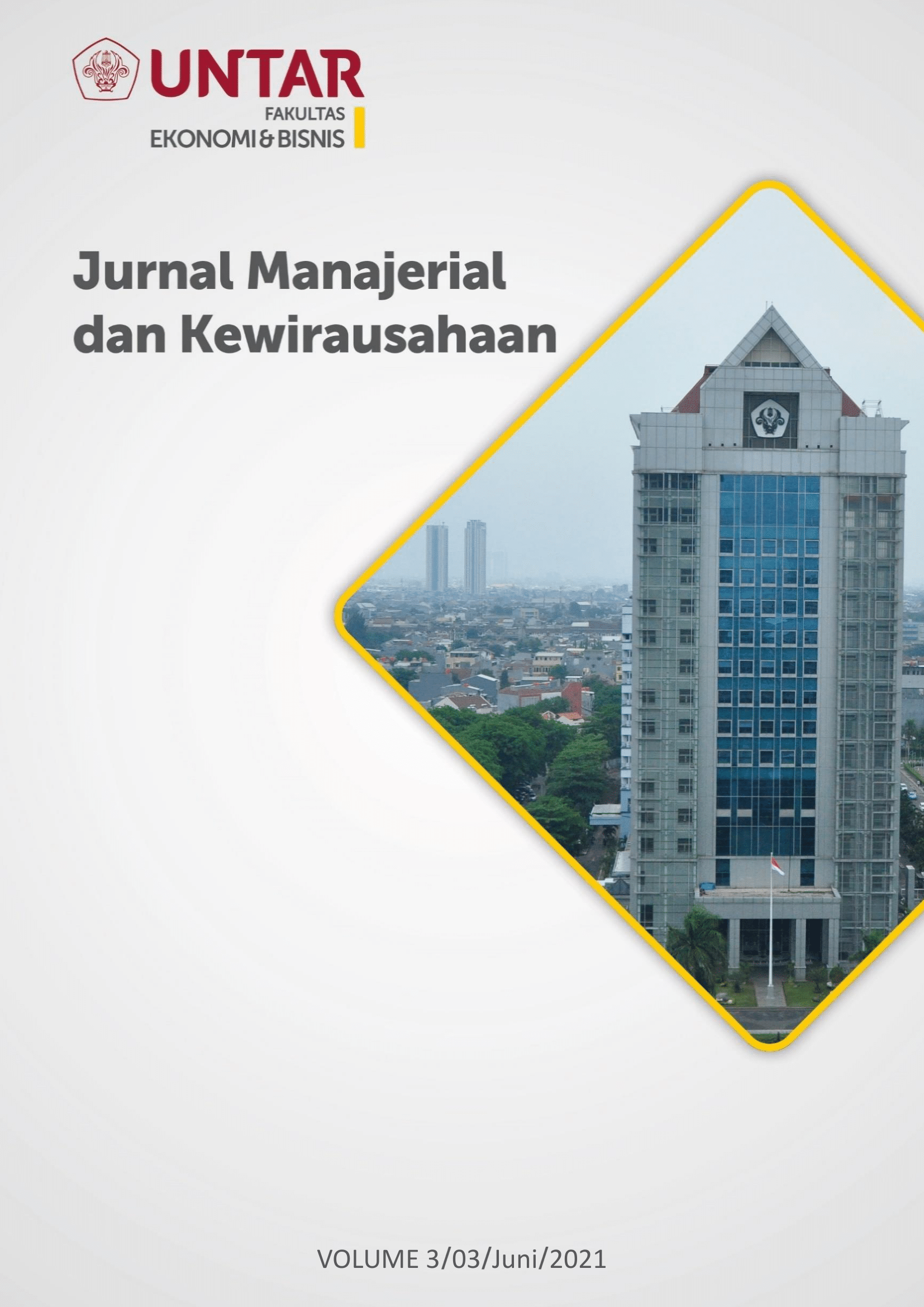Faktor–Faktor Yang Mempengaruhi Kinerja Umkm Bidang Kuliner Pada Masa Pandemi COVID – 19
Main Article Content
Abstract
The purpose of this study is to find out whether Entrepreneurship Skills, Market Orientation, Sales Orientation, and Entrepreneurship Competence have an influence on the performance of SMEs in the culinary field. The population in this study is SMEs in the culinary sector. The sample used in this study were 50 respondens who owned MSMEs in the culinary field in Tanjung Duren, West Jakarta. The sampling technique used is non-probability sampling with purposive sampling method. Data collection was carried out using a Likert scale questionnaire. Overall the results of this study are that Entrepreneurship Skills have an influence on the performance of SMEs in the culinary field in Tanjung Duren, West Jakarta during the Covid-19 pandemic, Market Orientation has no effect on the performance of SMEs in the culinary field in Tanjung Duren, West Jakarta during the Covid-19 pandemic. 19, Sales Orientation has an influence on the performance of SMEs in the culinary field in Tanjung Duren, West Jakarta during the Covid-19 pandemic, Entrepreneurship Competence has an influence on the performance of SMEs in the culinary field in Tanjung Duren, West Jakarta during the Covid-19 pandemic.
Article Details
This work is licensed under a Jurnal Muara Ilmu Ekonomi dan Bisnis Creative Commons Attribution-ShareAlike 4.0 International License.,/p>
References
Abdullah, A. M., Syed, A. F., & Rajennd, M. (2019). Entrepreneurial knowledge, skill, competencies and performance : A study of micro-enterprises in Kelantan, Malaysia. Asia Pasific Journal of Innovation and Entrepreneurship, 13(1), 29-48.
Aritonang, L. R. (1998). Penelitian Pemasaran. Universitas Tarumanagara: UPT Penerbitan.
Atuahene-Gima, K., & Ko, A. (2001). An empirical investigation of the effect of market orientation and entrepreneurship orientation alignment on product innovation. Organization Science, 12(1), 54-74.
Au, A., & Tse, A. (1995). The effects of market orientation on company performance in the service sector : a comparative study in Hongkong and New Zealand. Journal of International Consumer Marketing, 8(2), 77-87.
Barney, J. (1991). Firm resources and sustained competitive advantage. Journal of Management, 17(1), 99-120. Barney, J. B. (1986). Strategic factor markets: Expectations, luck, and business strategy. . Management Science,, 32(10), 1231-1242. Boles, J.,
Howard, W., & Donofrio, H. (2001). An investigation into the inter-relationship of work family conflict, family work conflict and work satisfaction. . Journal of Managerial Issues , Vol. 13(3), 376-390.
BPS. (2018). Statistik Penyediaan Makanan dan Minuman (Food and Beverage Service Activities Statistics).
Burhan, F. (2020). Bisnis Anjlok akibat Pandemi Corona UMKM Bisa Ubah Strategi Usaha. Jakarta.
Campbell, B., Ganco, M., Franco, A., & Agarwal, R. (2012). Who leaves, where and why worry? Employee mobility, entrepreneurship and effects on source firm performance. Strategic Management Journal, 33(1), 65-87.
Demirbag, M., K.S.C., L., Tatoglu, K., & Zaim, S. (2006). TQM and Market Orientations impact on SME's performance. Industrial Management and Data System, 106(8), 1206- 1228.
Dicksen, P. R. (1996). The static and dynamic mechanics of competitive theory. Journal of Marketing, 60, 102-106.
Endi, S., Surachman, A., & Djumilah, H. (2013). Entrepreneur Characteristics and Competency as Determinants of Business Performance in SMEs. IOSR . Journal of Business and Management, 7(3), 31-38.
Gerli, F., Gubitta, P., & Tognazzo, A. (2011). Entrepreneurial competencies and firm performance: an empirical study. “Entrepreneurial competencies and firm performance: an empirical study. VIII International Workshop on Human Resource Management Conference Proceedings, Seville.
Grant, R. (1991). The resource-based theory of competitive advantage: implications for strategy formulation. California Management Review, 33(3), 114-135.
Jaramillo, F., Ladik, D., Marshall, G., & Mulki, J. (2007). A meta- analysis of the relationship between sales orientation customer orientation (SOCO) and salesperson job performance. Journal of Business and Industrial Marketing, 22(5), 302-31.
Kohli, A., & Jawarski, B. (1990). Market orientation the construct, research propositions and managerial implications. . The Journal of Marketing, 54(2), 1-18.
Linan, F., & Chen, Y. (n.d.). Development and cross cultural application of a specific instrument to measure entrepreneurial intentions. Entrepreneurship Theory and Practice, 4(3), 257-272.
Mitchelmore, S., & Rowley, J. (2010). Entrepreneurial competencies: a literature review anddevelopment agenda. International Journal of Entrepreneurial Behavior and Research, 16(2), 92-111.
Morgan, N., Vorhies, D., & Mason, C. (2009). Market Orientation, marketing capabilities and firm performance. . Strategic Management Journal, 30(8), 909-920.
Muslimu, K., & Alhassan, M. (2020). Effect of entrepreneurial skills on small and medium scale enterprises (SMEs) performance: a study of registered businesses operating in sabon gari market kano. . Internasional Journal of Advanced Academic Research (Social and Management Sciences), 6(10).
Narver, J., & Slater, S. (1990). The effect of a market orientation on business profitability. TheJournal of Marketing, Vol. 54 No. 4, pp. 20-35.
Phelan, C., & Sharpley, R. (2012). Exploring entrepreneurial skills and competencies in farm tourism. Local Economy: The Journal of the Local Economy Policy Unit, 27(2), 103-118. Pyysiäinen, J., Anderson,
A., McElwee, G., & Vesala, K. (2006). Developing the entrepreneurial skills of farmers: some myths explored. International Journal of Entrepreneurial Behavior and Research, 12(1), 21-39.
Rizan, J., & Utama, L. (2020). Pengaruh Keterampilan Kewirausahaan, Orientasi Pasar dan Orientasi Penjualan terhadap Kinerja Usaha UMKM. Jurnal Manajerial dan Kewirausahaan, 2(4), 961-968.
Rumelt, R., Schendel, D., & Teece, D. (1994). Fundamental Issues in Strategy. Cambridge, MA: Harvard University Press.
Sugiyono. (2015). Metode Penelitian Kombinasi (Mix Methods). Bandung: Alfabeta.
Tehseen, S., & Ramayah. (2015). Entrepreneurial competencies and SMEs business success: The contingent role of external integration. Mediterranean Journal of Social Sciences, 6 (1), 50.
Trent, W., Christopher, R., Plouffe, B., & Gregoire. (2009). SOCO's impact on Individual Sales Performance : The integration of selling skills as a missing link. . Industrial Marketing Management, 32-44.
Utama, L., & Nadi, J. (2017). Pengaruh Kreativitas terhadap Kinerja Usaha dengan orientasi kewirausahaan sebagai mediasi pada wirausaha di ITC Cempaka Mas. Conference on Managerial and Behavorial Studies, 80-88.
Wetzels, M. K., & Lemmink, J. (2000). Antecedents and conse-quences of services. in Hand business to business services. In Hand book of services marketing and management. 343- 356.
Wu, W. (2009). A competency based model for the sucess of an entrepreneurial start up. WSEAS Transactions of business and economics. 6(6), 279-291.



